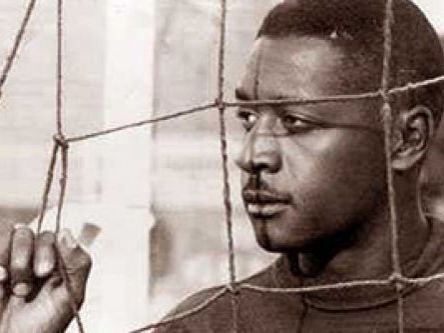One for Moacir Barbosa
1By The Spotter
 When, on the second last day of the 2016 Olympics, the modern messiah of Brazilian football Neymar calmly stroked his shootout penalty kick into the goal to claim victory in the Soccer final over Germany, it not only sent an economically-crocked nation with an impeached President into varying states of delirium and in addition avenged a scarcely conceivable 1-7 defeat to the same nation in the World Cup semi-final of 2014, it hopefully brought some respite to a tortured soul who departed this world a little over sixteen years ago…
When, on the second last day of the 2016 Olympics, the modern messiah of Brazilian football Neymar calmly stroked his shootout penalty kick into the goal to claim victory in the Soccer final over Germany, it not only sent an economically-crocked nation with an impeached President into varying states of delirium and in addition avenged a scarcely conceivable 1-7 defeat to the same nation in the World Cup semi-final of 2014, it hopefully brought some respite to a tortured soul who departed this world a little over sixteen years ago…
“There are only three people who have silenced the Maracana with just one movement: Frank Sinatra, The Pope and me”.
July 16, 1950. Estadio de Maracana, Rio De Janeiro, Brazil. An almost unfathomable 200,000 people watch as the time ticks by to the 79th minute of the final match of only the fourth-ever World Cup Finals Football tournament. The hosts are locked at 1-1 with Uruguay, the first-ever World Cup champions, twenty years previously.
Moving into the inside-right position near the Brazil goalmouth comes a rather diminutive Uruguayan forward. He dribbles the ball past his opponent and shapes as if he will square a pass into the centre. The Brazilian goalkeeper instinctively moves a couple of feet away from his near post towards the right of his six-yard goal box in anticipation of this outcome. The forward holds off on making his kick for just an instant and it is enough time to spy the narrow gap the goalkeeper has left. Like any natural born striker he seizes his opportunity in a nanosecond and unerringly slides the ball into the unguarded part of the goal; the goalkeeper is out of position, off balance and beaten easily. The deadly finisher was Alcides Ghiggia. The soon-to-be vilified goalkeeper was Moacir Barbosa. Uruguay 2, Brazil 1. That is how it stayed, and so began the ‘Maracanazo’- the curse of the Maracana, in the eyes of Brazilian football fans. Uruguay become champions a second time after Italy achieved the feat first in 1934 and 1938. Another nation on earth had yet to become champion.
The quote at the top you may have guessed by now, belongs to Alcides Ghiggia. And unfortunately, the ramifications of the defeat were paradoxically far worse than any eerie silence induced by Ghiggia’s goal in the Maracana. ‘Post mortems’ in the media about the shock defeat brought about even more shocking reactions as media and others implicitly and racially placed blame for the defeat onto the darker-skinned players in the team- most of the scorn being directed at one player above all: the goalkeeper, Moacir Barbosa.
Horribly, the derision towards Barbosa endured through decades, right up until he passed away in the year 2000. The poor, broken man was thought of as some kind of jinx- in the build-up to the 1994 World Cup in the USA he was very cruelly barred from attending the national team’s training camp for fear of putting a hex on them. That belief was unfortunately validated even further when Brazil won the World Cup for the first time in twenty-four years.
Only weeks before dying, Barbosa admitted it felt as though he had endured a life sentence for Uruguay’s victory. And he mentioned his saddest moment being not when Ghiggia’s shot beat him but when twenty years later at a market a woman walked past and told her young son, “That’s the man who lost the World Cup for us”.
It seems almost surreal that following the 1950 defeat, Barbosa actually spent the next stage of his life working at the Maracana. When he finished up someone with either a very strange sense of humour or a form of amnesia presented him with a set of goalposts from the ground. And what did Barbosa do with them? He took them into his backyard and burned them to the ground of course.
I really hope then Moacir Barbosa, that that victory by your nation last weekend in the incredible cauldron of the Maracana be one for you and may finally also bring some form of peace, at last.

[…] As luck would have it, within the last few days of his trip (at the end of this week, I believe), the iconic ‘Fla-Flu’ (Flamengo vs Fluminese- Rio’s bitter rivals) derby match was to take place. At the iconic Maracana. The stadium is still the holder of the record football attendance of some 199,000 (vs Uruguay, in the final tie of the 1950 World Cup. Brazil lost when a draw would have given them their first title. Many blamed the hapless goalie Barbosa for the final goal. His life became a misery thereafter. I’ve written about that before, in fact). […]